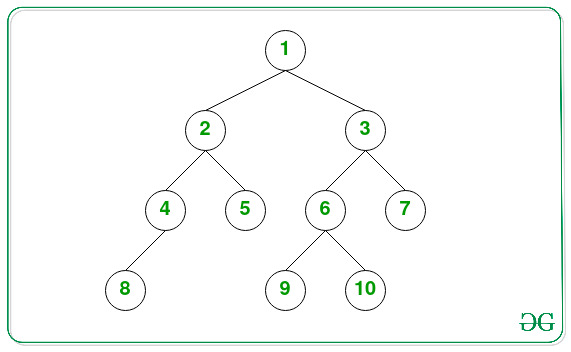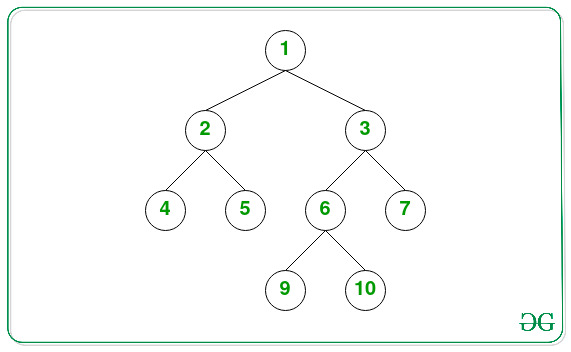给定一个由N 个节点组成的二叉树,这些节点的值与范围[1, N] 不同,任务是找到二叉树最深叶子的最低公共祖先。
例子:
Input:

Output: 1
Explanation: The deepest leaf nodes of the tree are {8, 9, 10}. Lowest common ancestor of these nodes is 1.
Input:

Output: 6
方法:给定的问题可以通过找到树的最大深度,然后执行 DFS 遍历来找到最低的公共祖先来解决。请按照以下步骤解决问题:
- 找到二叉树的最大深度并将其存储在一个变量中,比如depth 。
- 声明一个函数say DFS(root, curr)来查找深度级别节点的 LCS:
- 如果根为NULL ,则返回NULL 。
- 如果curr的值等于depth ,则返回当前节点。
- 递归调用左子树作为DFS(root⇾left, curr + 1)并将返回值存储在变量 say left 中。
- 递归调用右子树作为DFS(root⇾right, curr + 1)并将返回值存储在变量 say right 中。
- 如果left和right的值都不是NULL ,则返回当前节点,因为当前节点是最低共同祖先。
- 如果left不是 NULL ,则返回left 。否则,返回right 。
- 完成上述步骤后,打印函数调用DFS(root, 0)返回的值。
下面是上述方法的实现:
C++
// C++ program for the above approach
#include
using namespace std;
// Node of a Binary Tree
struct Node {
struct Node* left;
struct Node* right;
int data;
};
// Function to create
// a new tree Node
Node* newNode(int key)
{
Node* temp = new Node;
temp->data = key;
temp->left = temp->right = NULL;
return temp;
}
// Function to find the depth
// of the Binary Tree
int finddepth(Node* root)
{
// If root is not null
if (!root)
return 0;
// Left recursive subtree
int left = finddepth(root->left);
// Right recursive subtree
int right = finddepth(root->right);
// Returns the maximum depth
return 1 + max(left, right);
}
// Function to perform the depth
// first search on the binary tree
Node* dfs(Node* root, int curr,
int depth)
{
// If root is null
if (!root)
return NULL;
// If curr is equal to depth
if (curr == depth)
return root;
// Left recursive subtree
Node* left = dfs(root->left,
curr + 1, depth);
// Right recursive subtree
Node* right = dfs(root->right,
curr + 1, depth);
// If left and right are not null
if (left != NULL && right != NULL)
return root;
// Return left, if left is not null
// Otherwise return right
return left ? left : right;
}
// Function to find the LCA of the
// deepest nodes of the binary tree
Node* lcaOfDeepestLeaves(Node* root)
{
// If root is null
if (!root)
return NULL;
// Stores the deepest depth
// of the binary tree
int depth = finddepth(root) - 1;
// Return the LCA of the
// nodes at level depth
return dfs(root, 0, depth);
}
// Driver Code
int main()
{
// Given Binary Tree
Node* root = newNode(1);
root->left = newNode(2);
root->right = newNode(3);
root->left->left = newNode(4);
root->left->right = newNode(5);
root->right->left = newNode(6);
root->right->right = newNode(7);
root->right->left->left = newNode(8);
root->right->left->right = newNode(9);
cout << lcaOfDeepestLeaves(root)->data;
return 0;
} Java
// Java program for the above approach
// Node of a Binary Tree
class Node
{
Node left = null;
Node right = null;
int data;
Node(int data)
{
this.data = data;
}
}
class GFG{
// Function to find the depth
// of the Binary Tree
public static int findDepth(Node root)
{
// If root is not null
if (root == null)
return 0;
// Left recursive subtree
int left = findDepth(root.left);
// Right recursive subtree
int right = findDepth(root.right);
// Returns the maximum depth
return 1 + Math.max(left, right);
}
// Function to perform the depth
// first search on the binary tree
public static Node DFS(Node root, int curr,
int depth)
{
// If root is null
if (root == null)
return null;
// If curr is equal to depth
if (curr == depth)
return root;
// Left recursive subtree
Node left = DFS(root.left, curr + 1, depth);
// Right recursive subtree
Node right = DFS(root.right, curr + 1, depth);
// If left and right are not null
if (left != null && right != null)
return root;
// Return left, if left is not null
// Otherwise return right
return (left != null) ? left : right;
}
// Function to find the LCA of the
// deepest nodes of the binary tree
public static Node lcaOfDeepestLeaves(Node root)
{
// If root is null
if (root == null)
return null;
// Stores the deepest depth
// of the binary tree
int depth = findDepth(root) - 1;
// Return the LCA of the
// nodes at level depth
return DFS(root, 0, depth);
}
// Driver code
public static void main(String[] args)
{
// Given Binary Tree
Node root = new Node(1);
root.left = new Node(2);
root.right = new Node(3);
root.left.left = new Node(4);
root.left.right = new Node(5);
root.right.left = new Node(6);
root.right.right = new Node(7);
root.right.left.left = new Node(8);
root.right.left.right = new Node(9);
System.out.println(lcaOfDeepestLeaves(root).data);
}
}
// This code is contributed by girishthattePython3
# Python3 program for the above approach
# Node of a Binary Tree
class Node:
def __init__(self, d):
self.data = d
self.left = None
self.right = None
# Function to find the depth
# of the Binary Tree
def finddepth(root):
# If root is not null
if (not root):
return 0
# Left recursive subtree
left = finddepth(root.left)
# Right recursive subtree
right = finddepth(root.right)
# Returns the maximum depth
return 1 + max(left, right)
# Function to perform the depth
# first search on the binary tree
def dfs(root, curr, depth):
# If root is null
if (not root):
return None
# If curr is equal to depth
if (curr == depth):
return root
# Left recursive subtree
left = dfs(root.left, curr + 1, depth)
# Right recursive subtree
right = dfs(root.right, curr + 1, depth)
# If left and right are not null
if (left != None and right != None):
return root
# Return left, if left is not null
# Otherwise return right
return left if left else right
# Function to find the LCA of the
# deepest nodes of the binary tree
def lcaOfDeepestLeaves(root):
# If root is null
if (not root):
return None
# Stores the deepest depth
# of the binary tree
depth = finddepth(root) - 1
# Return the LCA of the
# nodes at level depth
return dfs(root, 0, depth)
# Driver Code
if __name__ == '__main__':
# Given Binary Tree
root = Node(1)
root.left = Node(2)
root.right = Node(3)
root.left.left = Node(4)
root.left.right = Node(5)
root.right.left = Node(6)
root.right.right = Node(7)
root.right.left.left = Node(8)
root.right.left.right = Node(9)
print(lcaOfDeepestLeaves(root).data)
# This code is contributed by mohit kumar 29.C#
// C# program for the above approach
using System;
// Node of a Binary Tree
class Node
{
public Node left = null;
public Node right = null;
public int data;
public Node(int data)
{
this.data = data;
}
}
public class GFG{
// Function to find the depth
// of the Binary Tree
static int findDepth(Node root)
{
// If root is not null
if (root == null)
return 0;
// Left recursive subtree
int left = findDepth(root.left);
// Right recursive subtree
int right = findDepth(root.right);
// Returns the maximum depth
return 1 + Math.Max(left, right);
}
// Function to perform the depth
// first search on the binary tree
static Node DFS(Node root, int curr,
int depth)
{
// If root is null
if (root == null)
return null;
// If curr is equal to depth
if (curr == depth)
return root;
// Left recursive subtree
Node left = DFS(root.left, curr + 1, depth);
// Right recursive subtree
Node right = DFS(root.right, curr + 1, depth);
// If left and right are not null
if (left != null && right != null)
return root;
// Return left, if left is not null
// Otherwise return right
return (left != null) ? left : right;
}
// Function to find the LCA of the
// deepest nodes of the binary tree
static Node lcaOfDeepestLeaves(Node root)
{
// If root is null
if (root == null)
return null;
// Stores the deepest depth
// of the binary tree
int depth = findDepth(root) - 1;
// Return the LCA of the
// nodes at level depth
return DFS(root, 0, depth);
}
// Driver code
public static void Main(String[] args)
{
// Given Binary Tree
Node root = new Node(1);
root.left = new Node(2);
root.right = new Node(3);
root.left.left = new Node(4);
root.left.right = new Node(5);
root.right.left = new Node(6);
root.right.right = new Node(7);
root.right.left.left = new Node(8);
root.right.left.right = new Node(9);
Console.WriteLine(lcaOfDeepestLeaves(root).data);
}
}
// This code is contributed by 29AjayKumar输出:
6时间复杂度: O(N)
辅助空间: O(1)
如果您想与行业专家一起参加直播课程,请参阅Geeks Classes Live